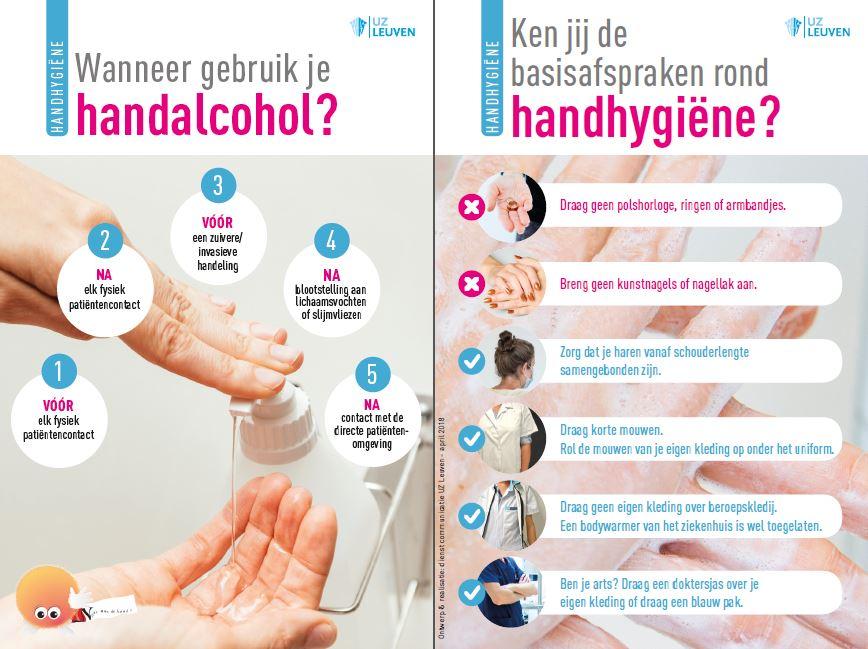Optimisation & knowledge development of the incident reporting system
The incident reporting system underwent a comprehensive revision in 2022, enabling faster and more effective action when unexpected events occur. This allows us to learn more from these incidents and implement measures to prevent them in the future. Specifically, we have ensured that staff can report incidents more quickly and easily, and that all reports are sent directly to supervisors for appropriate responses. Additionally, the process for handling serious incidents has been redesigned.
We have also developed training videos for all our staff to improve their knowledge and competencies in learning from incidents and to foster open discussions about them, with the goal of establishing a “no-blame culture”.
E-learning: transition from paediatric to adults care
The paediatric departments at UZ Leuven have launched the interactive tool “On the way: transition in paediatrics” for chronically ill children and adolescents and their parents. The four e-learning modules, filled with tips, information, and personal stories, provide additional support in preparing for the transition from paediatric to adult care.
New pressure ulcer mattresses
UZ Leuven places a strong emphasis on preventing pressure ulcers. Pressure ulcers occur in patients who are less able to move themselves, causing prolonged pressure on the skin. They lead to significant pain and discomfort, and their treatment is time-consuming and expensive. In 2023, as part of pressure ulcer prevention, the hospital transitioned to new pressure ulcer mattresses. These mattresses provide the same high level of prevention and comfort as the previous models but are quieter, ensuring patients experience fewer sleep disturbances and better sleep quality. Additionally, these mattresses facilitate easier transfers in and out of bed, improving comfort for both the patient and caregiver and expediting rehabilitation.
Internal audit system
UZ Leuven has recently introduced an internal audit system for planning and conducting internal quality audits of the organisation’s clinical activities. The objectives are twofold: first, to adopt a preventive approach by identifying and mapping potential problems and risks and implementing corrective actions to prevent them from leading to safety incidents. Second, to ensure strict compliance with government-imposed requirements, guaranteeing optimal readiness for external audits and inspections.
Through interviews and observations (both during activities and in the KWS system), the organisation and operations of a department are assessed, with attention to aspects such as patient identification, safe and accurate medication prescribing, preparation and administration, fall prevention, Early Warning Scores (EWS), as well as person-centred care, friendliness, empathy, and attentiveness to patients’ needs.
Patient panel
The UZ Leuven patient panel consists of a fixed group of patients and loved ones who meet four times a year to actively contribute ideas for improving care and services.
Fall prevention: pictograms
To make a patient’s mobility status immediately clear to caregivers, family, and visitors, geriatric departments use magnetic pictograms displayed in the patient’s room.
This project will be rolled out hospital-wide this year. These pictograms ensure that caregivers and family members are informed about the patient’s mobility, minimising the risk of misjudgements and aligning everyone’s understanding.
Using these pictograms significantly reduces the risk of falls and promotes fall prevention in collaboration with caregivers, patients, family, and visitors.

Magnetic icons instantly show a patient's moving ability to caregivers, family and visitors.
Hospital hygiene: hand hygiene, bloodstream infections and infection prevention
Preventing and managing infections is a major challenge and a critical issue for patients and healthcare providers. That is why the hospital hygiene department implements a rigorous infection prevention policy. Various quality projects are underway, and new initiatives are being launched to achieve this.
“Hand Hygiene” is an ongoing project that involves measuring and monitoring the use of hand sanitiser across multiple hospital departments, participating in national hand hygiene campaigns, and undertaking targeted actions focusing on specific hand hygiene concerns in certain units.

Hand hygiene - campaign images
Bloodstream infections also demand our attention. Hospital-wide, we closely monitor the number of bloodstream infections and catheter use. Specific and targeted actions are implemented based on this data.
A dedicated working group is currently evaluating the introduction of a new infusion system at UZ Leuven.
Finally, we are participating in the i-4-1 Health Interreg project, which maps antibiotic resistance and multidrug-resistant organisms in various Dutch and Belgian hospitals. Several infection parameters are measured, and improvement cycles are initiated and monitored. Through these projects, we are building an infection prevention policy that also enhances the quality of care.
Patient participation in improvement and quality projects
We aim to give patients an active role in their own care journey as well as in hospital-wide processes, thereby improving the quality of care and life.
Questions or feedback
-
For more information or questions about these initiatives, you can contact the quality department via kwaliteitsbeleid@uzleuven.be.